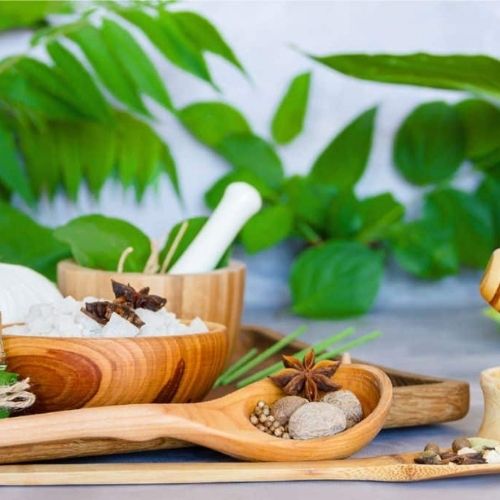Treat the root cause of allergies
Ayurvedic Treatment for Asthma
Ayurveda offers a holistic approach to treating asthma and allergies by balancing the body’s doshas (Vata, Pitta, and Kapha). It utilizes natural remedies, such as herbal formulations, dietary changes, and lifestyle modifications, to strengthen the respiratory system and improve immunity.

asthma treatment in Bangalore
What is Asthma and Why is Ayurveda for treating Asthma?
Asthma is a chronic respiratory condition characterized by inflammation and narrowing of the airways, leading to symptoms such as wheezing, shortness of breath, chest tightness, and coughing. It can be triggered by various factors, including allergens, respiratory infections, exercise, and environmental pollutants. Asthma attacks occur when the airways become overly sensitive, reacting strongly to triggers and resulting in difficulty breathing. While modern medicine offers several treatments to manage asthma symptoms, including inhalers and steroids, these often focus on symptom relief rather than addressing the root cause of the condition.
Ayurveda, an ancient system of natural healing that originated in India, offers a holistic approach to managing and treating asthma. According to Ayurvedic principles, asthma, known as “Tamaka Shwasa,” is primarily caused by an imbalance in the Kapha and Vata doshas, along with an accumulation of toxins (Ama) in the body. Ayurveda aims to restore balance by addressing these underlying causes through personalized treatment plans that include herbal remedies, dietary recommendations, breathing exercises, and lifestyle modifications. Herbal formulations such as Tulsi, Vasaka, and Yashtimadhu are commonly used to strengthen the respiratory system, reduce inflammation, and enhance immunity, providing long-term relief from asthma symptoms.
In addition to herbal treatments, Ayurveda emphasizes the importance of dietary and lifestyle changes to manage asthma effectively. It recommends a Kapha-pacifying diet that includes warm, easily digestible foods, avoiding cold and heavy foods that can increase mucus production. Regular practice of Pranayama (breathing exercises) and yoga can improve lung function and increase the body’s ability to handle allergens and stress. Ayurvedic detoxification therapies, like Panchakarma, are also used to eliminate toxins and purify the body, promoting overall respiratory health. By addressing the root causes of asthma and focusing on holistic well-being, Ayurveda provides a comprehensive and natural approach to managing this chronic respiratory condition.

Symptoms of Asthma
- Shortness of Breath: Difficulty breathing, especially during physical activity or at night.
- Wheezing: A whistling or squeaky sound when breathing, often more noticeable when exhaling.
- Chest Tightness: A feeling of constriction or pressure in the chest.
- Coughing: Frequent coughing, particularly at night or early in the morning; it may worsen with exercise or cold air.
- Trouble Sleeping: Difficulty sleeping due to coughing, wheezing, or shortness of breath.
Causes of Asthma
- Genetic Predisposition: Asthma often runs in families, suggesting a genetic component. Individuals with a family history of asthma or allergies are more likely to develop the condition.
- Environmental Factors: Exposure to certain environmental triggers, such as pollen, dust mites, mold, pet dander, and air pollution, can lead to the development of asthma or exacerbate existing symptoms. Occupational exposure to irritants like chemicals or fumes can also increase the risk.
- Respiratory Infections: Viral respiratory infections, especially during early childhood, can damage developing lungs and lead to the onset of asthma. Conditions like the common cold, flu, or respiratory syncytial virus (RSV) are common triggers.
- Allergens: Exposure to allergens, such as pollen, dust mites, mold spores, and pet dander, can trigger asthma symptoms in people who are sensitive or allergic.
- Lifestyle Factors: Physical activity, especially in cold or dry air, can trigger exercise-induced asthma. Additionally, smoking or exposure to secondhand smoke significantly increases the risk of developing asthma.
- Emotional Stress: Intense emotions or stress can trigger asthma symptoms by affecting breathing patterns and causing airway constriction.
Ayurvedic Medical Management
In the cases that are not chronic in origin and less severe in intensity, our panel of expert ayurvedic physicians use their ancient wisdom of ayurvedic medicines with the dietary changes over a period of time thereby curing the disease and making u breathe comfortably.
Panchakarma
When the disease is a very old one with a severe intensity or with complications, we need to use the purificatory therapies called panchakarma in which Vamana ( therapeutic emesis) or virechana ( therapeutic purgation ) is used which treats the doshas from the root cause thereby the treating the disease from the origin and the site. Following panchakarma a rasayana is planned to enhance the efficacy of the treatment.
FAQ
Schedule an Appointment with Dr Spine Ayurveda
Dr. Spine has an Ayurvedic treatment facility in all 3 centres. Please reserve your slot by using the form here. Alternatively, you can call 75 5070 5070 to schedule your appointment.

